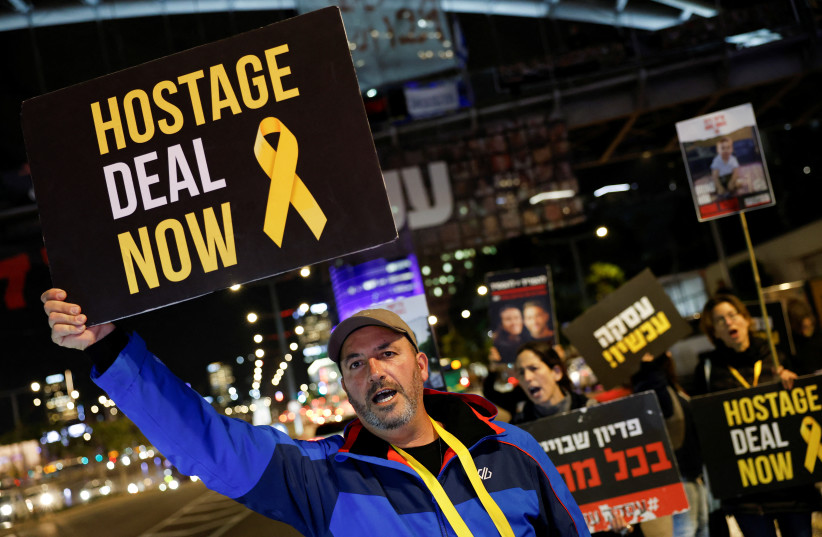In two weeks, Prime Minister Benjamin Netanyahu will head to the United States for his planned speech before a joint session of Congress.
Why he is even giving this speech at this moment in time remains unclear.
There is the danger of giving a controversial speech during such a sensitive political time in the US, but more importantly: why is he even going there? As one top American-Jewish leader told me this week, Netanyahu is one of the few people who can bring together mainstream Jews, Palestinians, and others who will all be protesting outside Capitol Hill on July 24.
Instead of speaking to US lawmakers, shouldn’t Netanyahu speak to the Israeli people and explain to them what is happening with the war, what the “day after” plan will look like, and how he plans to repair the damage to the nation since October 7?
Despite numerous reasons to oppose the speech, the Congress speech has instilled in me a glimmer of hope: it has paved the way for the current opportunity to broker a deal for the release of the Israeli hostages held by Hamas in the Gaza Strip.

Indeed, the speech is not the only reason – it might not even be the main reason – why Hamas has eased up some of its demands, but it is undoubtedly a reason.
Netanyahu wants to arrive in Washington with a victory under his belt and a ceasefire in place. He prefers to speak before Congress without days like Tuesday, when claims were going around about an Israeli bombing of a school compound near Khan Yunis, killing 30 people.
Instead, he wants to be able to tell Congress – in line with the four languages of redemption from the Passover Seder – that he was the person who “brought,” “redeemed,” “delivered,” and “took” the hostages out of their unbearable and brutal captivity in Gaza.
While there would be a great deal of cynicism in this, it doesn’t make a difference. There is one issue that needs to be the priority right now for Israel, and that is the return of the hostages.
Yes, Hamas needs to be degraded and prevented from returning to power in Gaza, but all of that can wait. There are hostages who are still alive, and every day that passes increases the chances that they will not be for much longer. They need to come home now.
AND NO, this is not a defeatist position, as some right-wing populists like to claim. It is the position of people who want a victory because, more than nine months into this war, the only real victory right now is for the people in Gaza to come home – the soldiers and the civilians; the women and the men; the children and the adults – all who are alive, as well as the bodies of those who are not.
Israel failed them, now it is time to bring them home
They are all our people, and they were all failed by the State of Israel. They deserve to come home, and we deserve to have them home with us.
The reason this is not defeatist is because Hamas is not going anywhere. Even if Israel were to continue fighting inside Gaza for the coming year and decide to give up trying to bring back the hostages in a deal, it is not as if Hamas would not exist in a year.
It would be weakened, it would have fewer fighters and less infrastructure, but it would still exist, at the very least as an idea.
The only way to end Hamas’s rule over Gaza and eliminate the full spectrum of its capabilities is to replace it with another governing entity. The problem is that this government has refused to articulate what the plan is or say who will replace Hamas.
In addition, even while acknowledging that more fighting will be needed, there is nothing wrong with taking a break that allows for the return of the people who are still alive.
That is something that is possible right now; it is not abstract, and it can be done. Lives can be saved at this exact moment.
It is astonishing to me that some people believe that something like this should wait. It is also astonishing that we have allowed the struggle for the hostages to become so politicized and to fall into the usual religious-secular, right-left discourse that has long plagued Israel and brought only disaster.
It’s to the point that, based on where people live or their level of observance, it is possible to tell what they think about the proposed hostage deal.
How did we come to allow the sanctity of life, the rescue of hostages, the reunification of broken families, and the extrication of young women from unspeakable horror to become political? What is wrong with us?
If there was any moment since October 7 that required leadership from Netanyahu, it is now.
In the coming days, he will have to decide whether he is willing to pay the ultimate political price and potentially lose his coalition by bringing back the hostages or sentence them to continued abuse and horror.
This is the moment in time that overshadows all others. He needs to make the right decision, and that is clear: bring them home now.
The writer is a senior fellow at the Jewish People Policy Institute (JPPI) and a former editor-in-chief of The Jerusalem Post.
